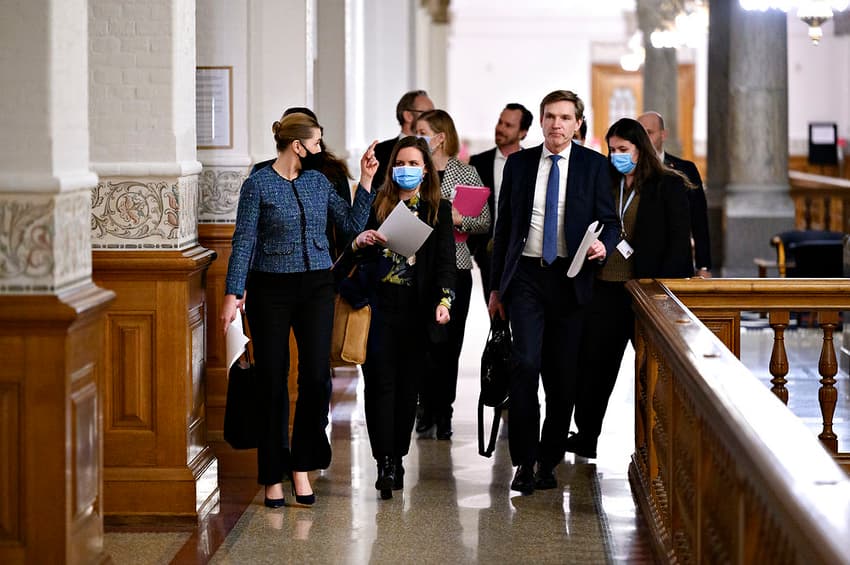Denmark announces timeline for end of most Covid-19 restrictions

The Danish government has announced a gradual timeline for lifting coronavirus restrictions and said it planned for the majority of restrictions to be lifted once all people over 50 have been vaccinated against the virus.
The plan was presented by Prime Minister Mette Frederiksen and front figures from the other political parties after a deal was agreed late on Monday night.
Businesses, schools and sports and culture will be able to reopen at various points throughout April and May under the deal, with vaccine passports required to use services in a number of instances.
The agreement text sets out a fixed point for ending restrictions “when the oldest and vulnerable citizens and citizens over 50 years old have been vaccinated with the first dose, if they want it”.
That point will signal the end of most restrictions, although some will remain including those “in relation to events which carry a risk of superspreading, including large events and nightlife, travel restrictions and general measures to reduce infections,” the agreement states.
READ ALSO:
- Could ‘health passports’ kickstart travel around Europe?
- Denmark calls for bids to build digital coronavirus passports
“We have agreed that it is a very, very important fixed point when everyone over 50 years has been vaccinated. This is however dependent on us being able to keep infections down and use vaccine passports,” Frederiksen said.
The use of vaccine passports means that documentation of either vaccination, a recent negative test, or recent (no longer active) infection will be required to use some services including hairdressers, tattoo artists and massage parlours, according to broadcaster DR’s report on the agreement.
The only party not to back the reopening plan, the far-right Nye Borgerlige (New Right), has cited use of vaccine passports as the reason it would not support the agreement.
The timescale set out by the plan is summarised below.
- April 6th: Further relaxation of school closures and opening of service industries such as hairdresser, although vaccine passports will be required to use them.
- April 21st: Larger shopping malls allowed to open. Cultural facilities such as museums, art galleries and libraries allowed to open, vaccine passports in effect. Restaurants allowed to serve outside.
- May 6th: Concert venues, theatres and cinemas allowed to open; restaurants permitted to operate indoor services.
- May 21st: Evening schools and other auxiliary education can reopen; all sports facilities allowed to reopen.
Comments
See Also
The plan was presented by Prime Minister Mette Frederiksen and front figures from the other political parties after a deal was agreed late on Monday night.
Businesses, schools and sports and culture will be able to reopen at various points throughout April and May under the deal, with vaccine passports required to use services in a number of instances.
The agreement text sets out a fixed point for ending restrictions “when the oldest and vulnerable citizens and citizens over 50 years old have been vaccinated with the first dose, if they want it”.
That point will signal the end of most restrictions, although some will remain including those “in relation to events which carry a risk of superspreading, including large events and nightlife, travel restrictions and general measures to reduce infections,” the agreement states.
READ ALSO:
- Could ‘health passports’ kickstart travel around Europe?
- Denmark calls for bids to build digital coronavirus passports
“We have agreed that it is a very, very important fixed point when everyone over 50 years has been vaccinated. This is however dependent on us being able to keep infections down and use vaccine passports,” Frederiksen said.
The use of vaccine passports means that documentation of either vaccination, a recent negative test, or recent (no longer active) infection will be required to use some services including hairdressers, tattoo artists and massage parlours, according to broadcaster DR’s report on the agreement.
The only party not to back the reopening plan, the far-right Nye Borgerlige (New Right), has cited use of vaccine passports as the reason it would not support the agreement.
The timescale set out by the plan is summarised below.
- April 6th: Further relaxation of school closures and opening of service industries such as hairdresser, although vaccine passports will be required to use them.
- April 21st: Larger shopping malls allowed to open. Cultural facilities such as museums, art galleries and libraries allowed to open, vaccine passports in effect. Restaurants allowed to serve outside.
- May 6th: Concert venues, theatres and cinemas allowed to open; restaurants permitted to operate indoor services.
- May 21st: Evening schools and other auxiliary education can reopen; all sports facilities allowed to reopen.
Join the conversation in our comments section below. Share your own views and experience and if you have a question or suggestion for our journalists then email us at [email protected].
Please keep comments civil, constructive and on topic – and make sure to read our terms of use before getting involved.
Please log in here to leave a comment.